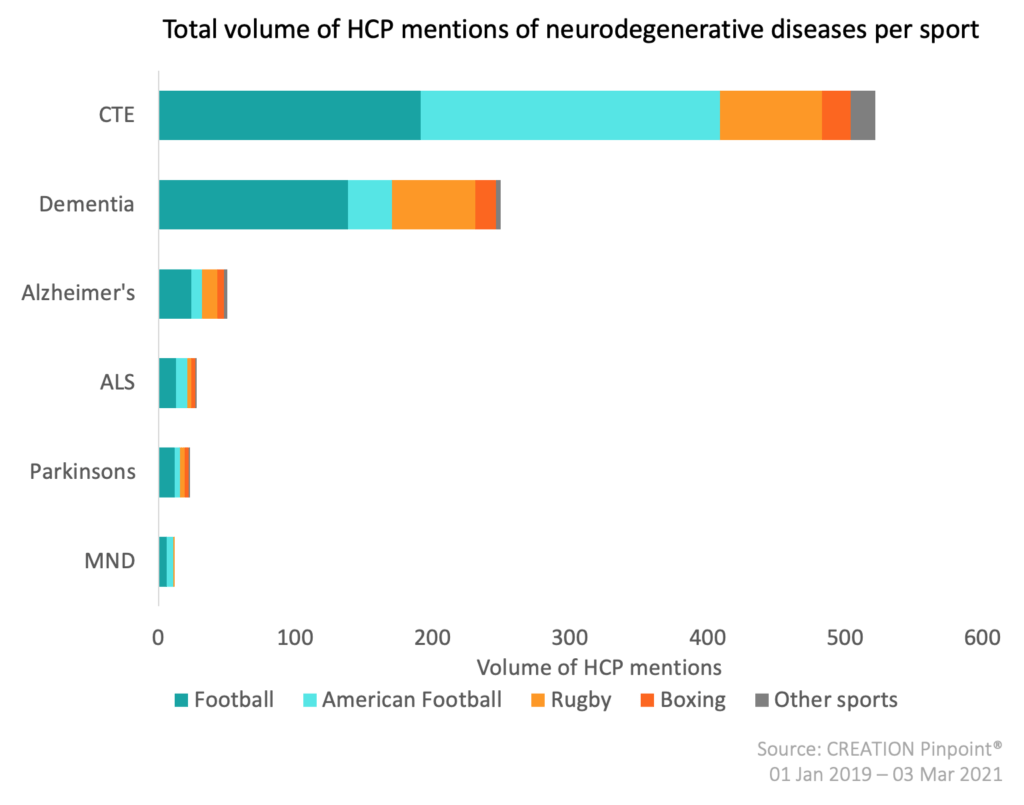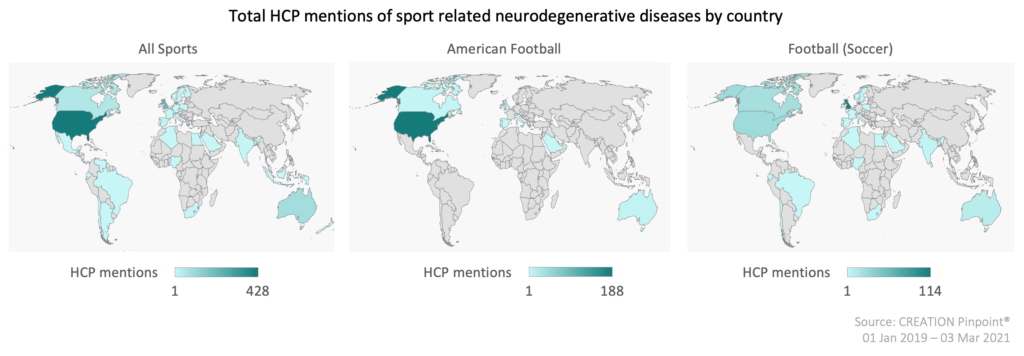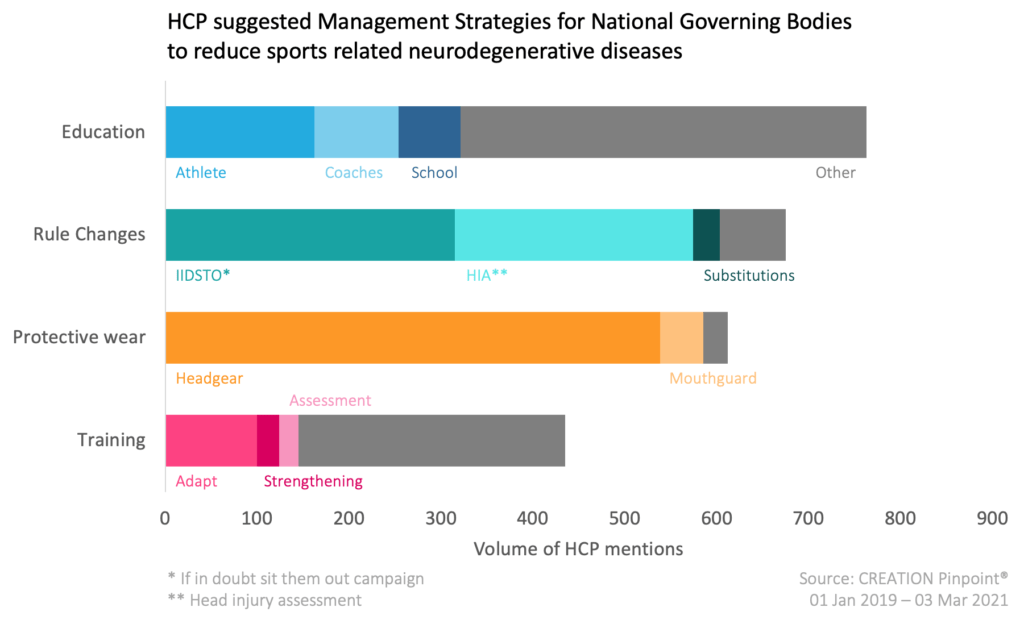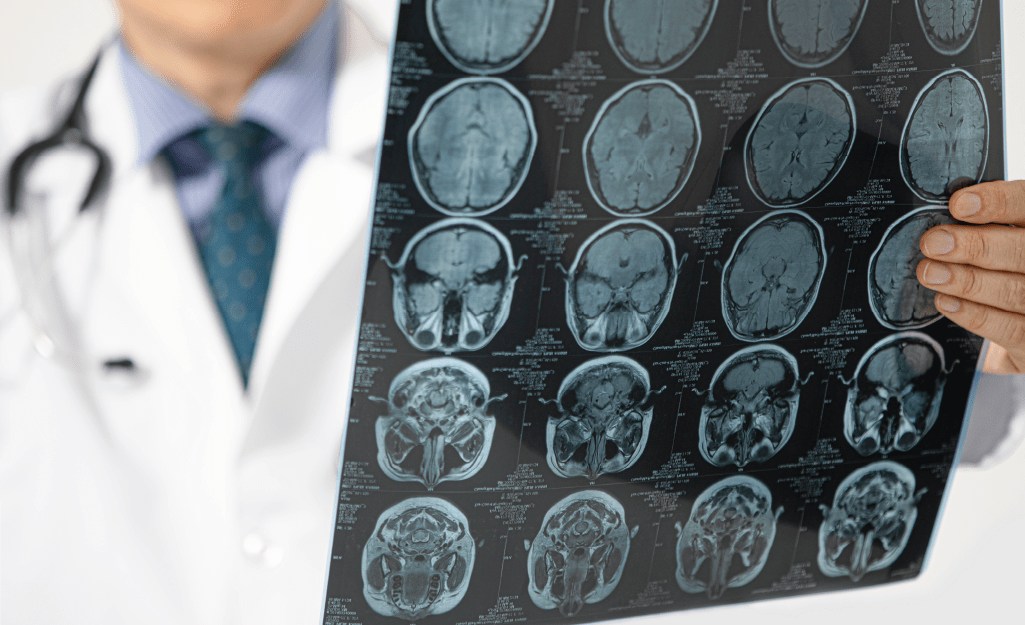On 03 March 2021 a British parliamentary inquiry into the link between sport and long-term brain injury was launched. This was followed by formal committee meetings in the UK Parliament to discuss concussion in sport on 18 May 2021 and 25 May 2021. Whilst this may have come as a surprise for some, it was not for many healthcare professionals (HCPs) who have held a long-term intrigue into the relationship between sporting head injuries and neurodegenerative diseases.
A 2019 study from experts at the University of Glasgow found former professional football players were three-and-a-half times more likely to die of a neurodegenerative disease than people of the same age range in the general population. As this link was already suspected by HCPs, we were interested in analysing their online posts from the past two years to see if any more insights in this therapy area could be revealed. Furthermore, could these insights support the people responsible for shaping sport in the future?
HCPs discuss CTE and popular sports
From 01 January 2019 to 03 March 2021 there were a total of 18,121 posts online from HCPs mentioning sport and head injuries. Of these posts, 1,002 referenced a link to neurodegenerative diseases, authored by 588 HCPs worldwide. All posts collected were in English and were from a range of sites, but Twitter conversations made up the majority of data.
HCPs aimed to raise awareness of the impact that head injuries in sport can have in the development of neurodegenerative diseases. Naturally there was a greater focus on the most popular sports with association football being mentioned the most (285 times), whilst American football (237 times), rugby (116 times) and boxing (36 times) were the other frequently mentioned sports.
When examining the online posts of HCPs mentioning sport and neurodegenerative diseases, we saw that over 50% referenced chronic traumatic encephalopathy (CTE), this is unsurprising as a widely held opinion amongst HCPs is that repeated head traumas cause CTE.

However, after further analysis it was revealed that in the HCP online conversation there is a dispute into how valid these claims are. Some HCPs believe that more supportive research is needed before a definitive link can be made between head injuries and CTE as well as other neurodegenerative diseases. Neuropsychologist Dr Mark Barisa and neuropathologist Dr Willie Stewart are two doctors in the field of neurology who show a difference of opinion when discussing the long term impact of head injuries in sport.
Take Home Message: CTE is present in people without a history of contact sports, repeated concussions, or subconcussion head impacts.
https://t.co/KR9PDLPtpu— Mark Barisa (@BarisaMark) June 7, 2020
“It is very hypothetical, the science is not black and white,” said Sweeney. “There is no scientific proof of the causal link between #concussion and #CTE, that is not a proven thing"
Had to check the date there. Is this really sport position in 2020?https://t.co/XbeIrRx7OJ
— Dr Willie Stewart (@WillStewNeuro) December 12, 2020
Are opinions universally shared?
One possible reason for the difference in opinion of Mark Barisa and Willie Stewart is their geographical locations. Mark Barisa’s suspicion towards head injuries causing CTE is reflective of many USA HCPs who believe the increased media attention surrounding the issue is not substantiated. Of the 424 posts from HCPs in the United States 25% were associated with a negative connotation, often doubt.
It is worth mentioning that this topic was politically polarising in the States after former president Donald Trump’s comments regarding traumatic brain injuries which could have influenced HCPs opinions based on their political allegiances.
On the other side of the Atlantic UK HCPs commended governing bodies for adopting new guidelines, of the 213 posts from HCPs in the UK only 11% were associated with negative connotations, moreover, of these 23 negative posts only 2 expressed doubt in head injuries being linked to neurodegenerative diseases.
The USA and UK dominated conversation of this topic with over 75% of the total posts coming from HCPs in these two countries. The type of sports mentioned in different countries was indicative of their popularity within that nation as can be seen below with the differences in mentions of the two ‘footballs’.

How would HCPs solve the problem?
The lack of a cure for neurodegenerative diseases means HCPs focus their online conversations on prevention of traumatic brain injuries, rather than combatting the symptoms. HCPs believe if we are to see a reduction in head injuries and subsequent neurodegenerative diseases from sport that responsibility lies with national governing bodies and those in the positions of power in sports to make changes. Many favour a top-down approach where it is not the duty of individual players to protect themselves but for their sports governing bodies to do so.
When examining potential management strategies for reducing head injuries in sport, education for all people involved was the most mentioned approach with 763 HCP posts highlighting the need to educate players and managers about the potential implications of brain injury so they have a better understanding to make the right decisions in the event of an injury.

Rule changes were another management strategy well received by HCPs. Neurophysiologist Elaine O’Flaherty shared her support by retweeting a post shared by Headway – the brain injury association. Interestingly, whilst headgear and protective wear were frequently mentioned, the majority of these conversations showed HCPs do not approve of their effectiveness in protecting sportspeople from head injuries.
Good to see progress might finally be made on concussion protocols in football. We have to keep pushing to ensure player safety is put first – a key message of our ‘If in doubt, sit it out!’ #ConcussionAware campaign. https://t.co/2QFq5v0scz @UEFA @alanshearer @chris_sutton73
— Headway – the brain injury association (@HeadwayUK) May 30, 2019
Where do we go from here?
Many of the HCPs who commented on head injuries in sports and their link to neurodegenerative diseases are fans of sports themselves and do not want to see new empty rules brought in for arguments sake that will harm sport or potentially the players. They are aware there will always be an element of risk involved in sport but when does a risk become unacceptable?
HCPs believe national governing bodies need to ask themselves if they can do more to protect the players in their sport from preventable life changing diseases as a result of head injuries.
In ending this article we would like to draw attention to the work of Peter Robinson and Karen Robinson who are working tirelessly to raise awareness of the dangers of traumatic brain injuries and concussion, after their 14 year old son Ben died during a rugby game. It is their, and many HCPs’ opinion, that a greater level of research needs to be conducted into the link between head injuries in sport and neurodegenerative diseases so that more can be done to improve player safety.
For more information on what HCPs across the globe are discussing on any health topic and for ways of supporting them, please get in touch, we’d love to help.
 By Mark Sullivan
By Mark Sullivan 



